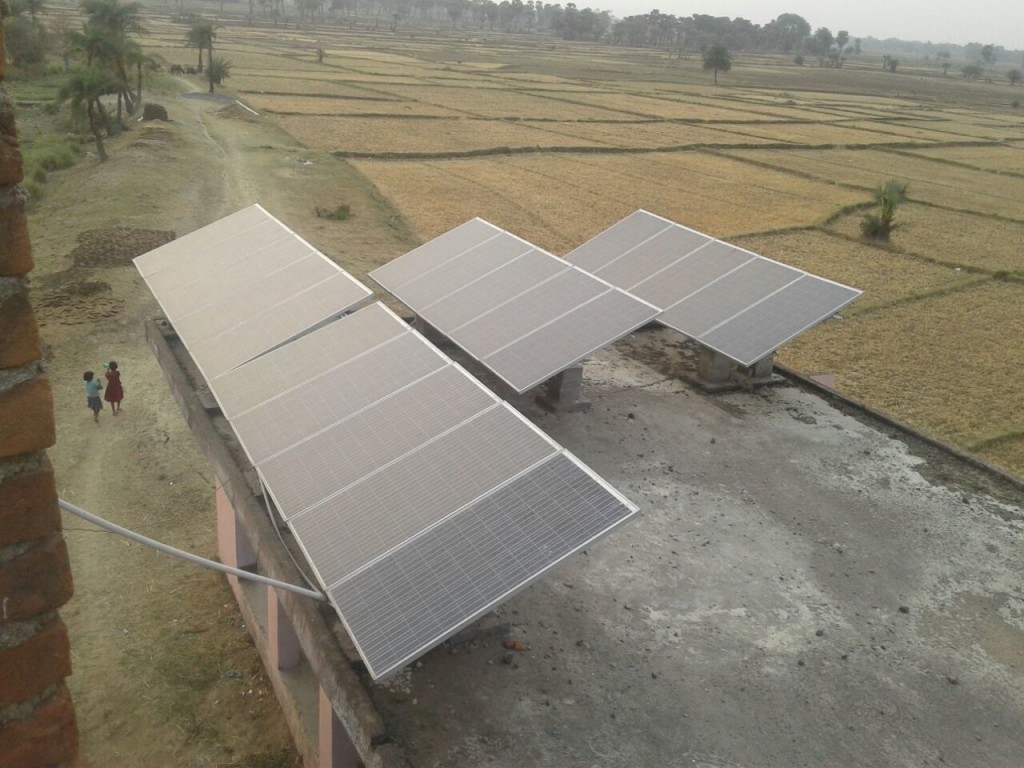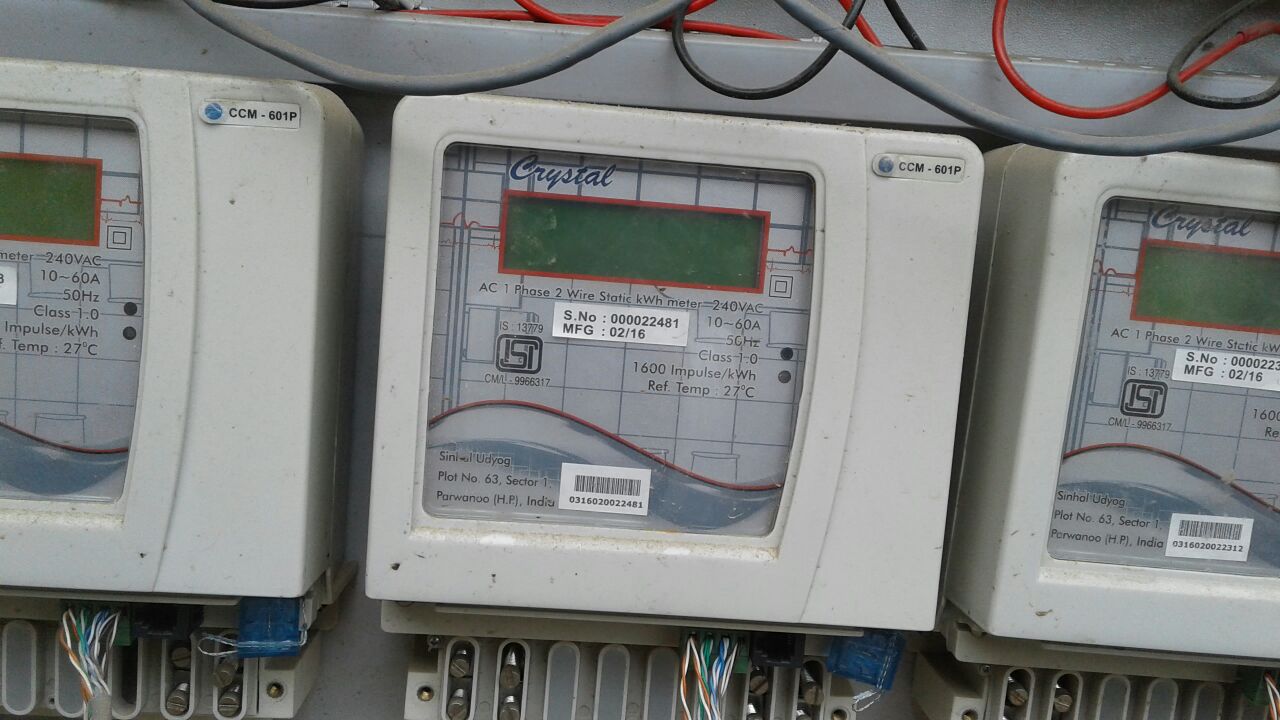Recently I had an opportunity to meet with Amrish Kumar Joshi, a JEEVIKA block Coordinator for Tankuppa, Gaya, Bihar. The Bihar Rural Livelihoods Promotion Society’s JEEVIKA has been working on renewable energy installations in the Tankuppa block. This area was previously infamously known as a corridor for Naxal operations. Solar mini-grids have been set up and are now operational in two villages.
At The Badil Bigha Village:
The village is situated on the foothills of the sacred the Brahmayoni Hills in Gaya. I reached the village in after an hour’s journey from Gaya town. Amrish Joshi, who was guiding me, informed me that Central Electronics Limited (CEL) had full-fledged technical assistance to pilot this CSR project. They aimed to install a 15 KW solar mini-grid.
Though I saw a transformer outside the village, villagers informed me that the village had not been electrified since 1960. The installation of a solar mini-grid was started in early 2015 and has been successfully operational since May 2016. Now the new 15 KW solar mini-grid is distributing power through a centralised power station with an individual smart meter. The solar mini-grid system is comprised of 15 KW Photovoltaic Panels (PV) connected to a battery bank. There are three separate 3KW DC pumps installed at specific locations to facilitate drip irrigation to the farmers. Each beneficiary has been provided with two 5W LED bulbs, one 20W DC fan and one 5W solar lantern with the connection.
Community-Based Management of Solar Off-Grid in Badil Bigha:
This project is owned and operated by the village women cell – JEEVIKA. Involvement of women is one of the most revolutionary components of developing an expert knowledge resource of solar mini-grid operation. Working through community inclusion at all levels of power distribution and maintenance is a big plus too. The village energy committee is working to review price slabs in a unanimous consensus with households accessing electricity. The JEEVIKA Women Cell has informed each household/beneficiary about how energy would change livelihoods and how this solar mini-grid shall bring dynamic economic empowerment in the village.
It’s an opportunity for the village community to utilize this CSR pilot project for social, economic and environmental empowerment. Community ownership has an important role to play in the sustainability of the project and its economic inclusion. Gender inclusion is one of the driving forces of the project operation. Women leader review how an income deficit village has started scaling up livelihoods after the installation of solarised Drip Irrigation Pump sets.
The Women Cell calls on meeting at a common place where all villagers (men and women) participate. They point out this paradigm shift in the transitioning quality of life and debate on how this solar mini-grid should be maintained to continue distributing power effectively and efficiently. The Women Cell also specifically ensures absolute transparency and accountability in maintaining the solar mini-grid. They develop an integrated environment of community ownership which ensures reliability and long-term sustainability to the project. They also discharge major responsibilities in project operation such as charge collection, the registration of enrolled consumers, hiring local technical assistance, proper and up-to-date documentation of financial transaction and distribution of electrical appliances to each beneficiary.
Badil Bigha has now overcome clouds of darkness. Villagers are using electricity at their homes, charging their mobiles, watching television and using the Internet to get connected. Recently, Victoria, a Cambridge University student visited Badil Bigha’s solar mini-grid. She is studying the socio-economic paradigm shift after installation of a smart solar mini-grid in the village. Victoria appreciated this dynamic transition in the community where women are empowering a change in life and livelihoods.
At The Barsha Pipara Village:
This village is one and a half hours away from Gaya town. Barsha Pipra seems to be one of the remote rural agglomerations which lacks basic public amenities. Since independence, the village has been residing under never-ending darkness. Being a core Naxal belt, the government’s policies are running completely off-road. Since after inception of the village panchayat, Barsha Pipra has been standing uprooted due to vast political contrast and conflict at local level.
Central Electronics Limited under its CSR pilot project installed a Solar Mini-Grid of 30 KW capacity. Under CEL’s technical assistance and the village Women Cell, JEEVIKA has owned this solar mini-grid at its management and operation level. The solar mini-grid project started its construction in early 2015 and started distribution in May 2016. This village has a larger configuration and has plans for expansion in over 200 households.
Technical experts had set up two centralised powerhouses having the installed capacity of 15 KW each for efficient and easy distribution of power to all beneficiaries. Each powerhouse is connected to battery bank. Though this project is also based on community ownership where village women have owned and looked after the operation. They indulge a wider community for ownership to this project.
The Tankuppa JEEVIKA coordinator discussed the challenges in the smooth running of the solar mini-grid in this village. Political conflict at the Gram Panchayat level had affected this project. They have adapted to a long reign of darkness. There was even a lack of unanimity at community level over the minimal charges for the maintenance, management and operation of the power station. Local politicians disseminated rumours to dismantle the proper functioning of this ambitious solar project. They think that this is a government-owned project, and they shouldn’t pay charges.
The Women Organization Cell, JEEVIKA with a facilitator, technical experts, JEEVIKA block coordinator and other officials, started their confrontations convincing them about the significance of this project in empowering rural life and livelihoods. The women of the village, in particular, had developed an understanding their role and inclusion in this project. Village women showed tremendous integration helping this solar mini-grid become operational. The community is sensing the end of a long dark regime. Villagers can charge their mobiles, use bulbs and fans etc.
The Viability Of Community-Based Solar Mini-Grid:
The solar mini-grid of 100 KW installed capacity is one of the first such solar power projects in Bihar. Dharnai became so popular that every article and author counts this village in the top 10 unique villages of India. But no one has ever gone to observe the viability of the solar mini-grid. Greenpeace India had funded this project and BASIX was managing the implementation, distribution and maintenance. BASIX formed a village organisation to own and look after maintenance. BASIX worked on cohesively on capacity building.
As this is a Greenpeace India pilot project, beneficiaries won’t have to pay charges for the first year. Greenpeace invited the Chief Minister to inaugurate the power station. The CM expressed serious disappointment that the village had not been connected to the central power grid since independence. Dharnai was connected to the central power grid, one month after the inauguration. Now villagers have two distinct power alternatives. They are well connected to government’s power grid and solar mini-grid.
Till the first-year beneficiaries continued utilising powers from both grid systems. The problem started when BASIX started charging for power in the second year and many beneficiaries removed their connections from the solar power grid. Greenpeace has already invested a huge amount in this project. Though there is obvious empowerment at the community level, the Dharnai solar off-grid is a setback. Either BASIX has so far failed to mobilize community ownership in true letter and spirit at the grass root level or they couldn’t be able to fix charges in compare to government’s electricity distribution. I personally doubt
I personally doubt the ability of BASIX in building community ownership. BASIX operates more like energy entrepreneurs creating a marked discrimination between beneficiaries. The solar mini-grid projects in Badil Bigha and Barsha Pipra respectively are owned and operated by the village women organization of JEEVIKA. This is the kind of project which satisfies the core objectives of the Sustainable Development Goals (SDGs) including gender empowerment and clean and green energy generation. The viability of solar off-grid projects enshrines in strong community ownership and women inclusion to help empower the economy and the community. Community ownership based on inducing a unanimous interlinking of beneficiaries help in the long run sustainability of such off-grid solar projects.
Future of Solar Off-Grid Projects in Bihar:
Bihar recently passed the ‘Policy for Promotion of New & Renewable Energy Resources 2017’ with the slogan march ensuring ‘Power for All’ in Bihar. It’s a policy based on technology-specific targets to produce 2969MW of solar power by 2022. The policy targets dedicated rooftops (RTs) of 1000 MW with both net metering and gross metering mechanism. It will be reviewed twice – once during the mid-term and the second at the end of the operative period. The New and Renewable Energy Policy ensures grid-connected solar rooftop promotion of Photovoltaic Panels projects. Setting an ambitious target of 2969 MW of grid-connected solar panels in the State with a special provision of 1000MW for Rooftop Solar PV. The Bihar government approves and mandates the utilisation of all government and municipal offices building roofs for the RT PV projects.
The Bihar Policy for Promotion of New & Renewable Energy 2017, ensures that solar mini-grids will access and improve rural electrification by achieving 100 MW capacity in unreserved areas (villages and hamlets) which don’t have electricity as well as the under served areas. All the projects implemented under the subsidy and non-subsidy model shall be constructed on a build, own, operate and maintain (BOOM) basis and they will be encouraged to access other Central Government subsidies & incentives.
Article Source: YKA



